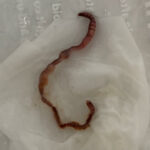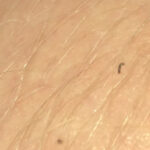Whipworms (Trichuris trichiura) is a type of parasite that can affect felines and canines. Whipworm eggs can be found in water, soil, food, animal feces, and animal flesh. Whipworms can live in these environments for a few months up to several years.
Cats may contract whipworms by digging in infested soil, picking at dead animals, drinking infested water, ingesting egg-laden foods, or by interacting with another animal that has the condition. One of the most obvious symptoms of whipworm is bloody diarrhea or large bowel inflammation. Other symptoms include dehydration, anemia, fecal incontinence, and weight loss. To test for whipworm, your veterinarian will collect a stool sample and immerse it in water. If eggs or worms are present, they will float to the surface.
If your vet finds whipworms in your cat, he will prescribe a round of powerful antibiotics to kill the worms and their eggs. If worms or eggs are still present after a round of treatment, your vet may prescribe another round. After round two, your cat should be whipworm free. After this, prevention, and not treatment, is up to you.
There are several ways to prevent whipworms in cats. One of the best ways to prevent a serious cat worm infection is to have your cat screened for worms twice per year. If your cat is considered high-risk for worms, you should have him screened more than twice a year. High-risk cats typically live in condensed urban areas and they usually live in a home with more than one pet.
Outdoor cats are especially susceptible to whipworms. Outdoor cats may come in contact with infested materials more often than indoor cats. Animal carcasses such as rodents and rabbits may contain whipworms, so if you have an outdoor cat, it is impossible to keep your cat away from them. You may want to rethink allowing your cat to roam around freely outdoors.
It’s also a good idea to keep your cat clean and well groomed. You should also dispose of cat feces immediately. Never leave it in piles in the litter box. Whipworm eggs can remain infectious for years, and other worms such as hookworm larvae can multiply quickly in dirty litter boxes.
If you notice any of the symptoms of whipworms in your cat, please contact a vet immediately. DO NOT ATTEMPT TO TREAT YOUR CAT AT HOME.
Types of Whipworm Treatments
Most vets will prescribe Mebendazole. Mebendazole is an anthelmintic that is used to treat whipworm, hookworm, pinworm, and roundworm. This medication must be taken by mouth for three days. Mebendazole is usually prescribed if symptoms are present. Another treatment is Albendazole. Albendazole is an antiparasitic anthelmintic. In addition to controlling whipworm infestations, it is also prescribed quite frequently to control tapeworms. Although it is used as an alternative therapy, it may still be just as effective as Mebendazole.
Again, please discuss treatment options wit your vet. You should only administer care to your pet under a vets supervision. It is never a good idea to treat your cat or make decisions about your pet’s health based solely on advice obtained from the Internet.
All About Worms is always free, always reader-supported. Your tips via CashApp, Venmo, or Paypal are appreciated! Receipts will come from ISIPP Publishing.














PLEASE HELP…I need to know what these things are and how to kill them NOW…There are long stringlike worms ALL OVER my boyfriends house and they are driving me nuts! There are also some small round white ones –don’t know which one is stinging me but one of them is. Doesn’t leave sores, etc., just crawling or “waving” on everything, from curtains, to furniture, to refrigerator to ME & the dog. This has just started lately after a bad round with roaches that one of his friends brought to him a couple of cardboard boxes of things.Used Bengal Roach spray powder on them which was amazing in takng care of them, but now he has these things and I am on the very edge of getting out and not coming back. Can you help please???? Thanks// Jessie